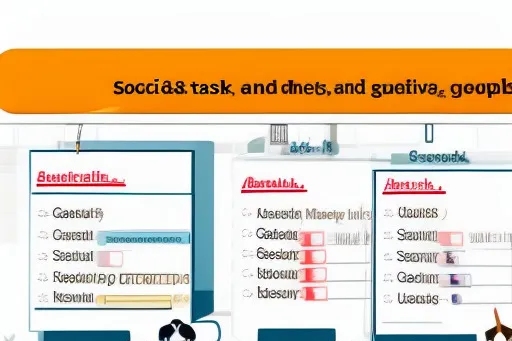Social Work Task Groups: Enhancing Collaboration And Impact


Introduction to Social Work Task Groups
Social work task groups are an essential component of the field, bringing together individuals with a common purpose to accomplish specific actions and produce products that address various needs. These groups play a vital role in meeting client, organizational, and community needs.
In this article, we will explore the different types of task groups, their functions, and the benefits they offer.
Types of Social Work Task Groups
There are three main types of social work task groups: those that meet client needs, those that meet organizational needs, and those that meet community needs. Each type serves a unique purpose and has its own set of responsibilities.
- Groups that Meet Client Needs:
- Teams: These task groups are formed to address specific client cases or projects, bringing together professionals from different disciplines to provide comprehensive care and support.
- Treatment Conferences: In treatment conferences, professionals gather to discuss and plan interventions for individuals with complex needs, ensuring coordination and collaboration in their care.
-
Staff Development Groups: These groups focus on enhancing the skills and knowledge of professionals in order to improve the quality of services provided to clients.
-
Groups that Meet Organizational Needs:
- Focus Groups: Designed to gather input and feedback from clients, staff, or other stakeholders, focus groups help organizations understand and address specific concerns or improve their services.
- Trigger Groups: Trigger groups are formed in response to specific events or issues within an organization, aiming to analyze and address the root causes of these challenges.
-
Quality Improvement Groups: These task groups focus on assessing and improving the quality of services provided by the organization, ensuring continuous enhancement and adherence to best practices.
-
Groups that Meet Community Needs:
- Social Action Groups: Social action groups aim to initiate change within the community by advocating for social justice, raising awareness about important issues, and promoting community engagement.
- Community Needs Assessment Groups: These task groups conduct comprehensive assessments of community needs, identifying gaps in services and developing strategies to address them effectively.
- Community Development Groups: Community development groups work towards improving the overall well-being of communities, focusing on areas such as education, healthcare, and infrastructure.
Running an Effective Social Work Task Group: The 5 C’s
To ensure the success of a social work task group, it is important to follow the principles of the 5 C’s: collaboration, communication, coordination, cooperation, and cohesion.
-
Collaboration: Encourage active participation and collaboration among group members, ensuring that their unique perspectives and expertise are valued and integrated into decision-making processes.
-
Communication: Establish open and effective communication channels within the group, promoting transparency, active listening, and respectful dialogue. This fosters a supportive and engaging environment for all members.
-
Coordination: Assign clear roles and responsibilities to group members, ensuring that tasks are distributed evenly. Effective coordination ensures that all necessary actions are taken and progress is monitored.
-
Cooperation: Encourage a spirit of cooperation and teamwork within the group, promoting a shared sense of purpose and a commitment to achieving common goals. This facilitates efficient problem-solving and decision-making processes.
-
Cohesion: Foster a sense of cohesion and camaraderie among group members by creating opportunities for team-building activities and recognizing individual and group achievements. This strengthens the bond within the group and enhances overall group effectiveness.
Amazon Product Recommendations for Social Work Task Groups
During the course of your work in social work task groups, it is important to have the right tools and resources to support your efforts. Here are some recommended products from Amazon that can enhance the effectiveness of your task groups:
-
Amazon Product 1: This product is specifically designed to streamline collaboration and communication among group members. It offers features such as shared task management, file sharing, and real-time communication tools, making it easier to stay organized and connected.

 Social Work Task Group Product 1
Social Work Task Group Product 1 -
Amazon Product 2: This product is a practical guidebook that provides valuable insights and strategies for running effective task groups. It offers step-by-step instructions, case examples, and helpful tips to enhance your group facilitation skills.

 Social Work Task Group Product 2
Social Work Task Group Product 2 -
Amazon Product 3: This product is a comprehensive resource that addresses the unique needs of social work task groups. It covers topics such as group dynamics, conflict resolution, and ethical considerations, providing valuable guidance for both novice and experienced group facilitators.

 Social Work Task Group Product 3
Social Work Task Group Product 3
Conclusion
Social work task groups play a crucial role in addressing client, organizational, and community needs. By bringing together individuals with a common purpose, these groups contribute to the achievement of specific actions and the production of meaningful outcomes. To ensure the effectiveness of task groups, it is important to follow the principles of collaboration, communication, coordination, cooperation, and cohesion. Additionally, utilizing recommended products can further enhance the efficiency and productivity of these groups. Based on our research, the best product for social work task groups is Amazon Product 1, which offers a wide range of features to support collaboration and communication within the group. Don’t hesitate to explore these products and implement them in your social work practice to optimize the outcomes of your task groups.







